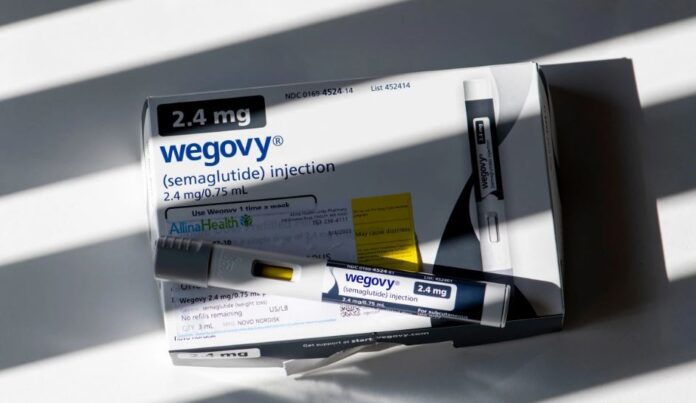Experts caution that many of the 65 million people registered in the federal health insurance program may see an increase in their monthly premium costs as a result of Medicare’s recent decision to cover the weight-loss medication Wegovy for recipients who have a risk of heart disease.
It is unknown how much the price will increase. The number of millions who are eligible for the well-known drug, which costs around $1,300 per month, will determine how much the premium hike will be.
It is conceivable that rates may increase as early as 2025, but at least one health policy expert believes that increases in 2026 or later are more plausible.
The head of Georgetown University’s O’Neill Institute for National and Global Health Law, Lawrence Gostin, expressed serious concerns about both Medicare funding and rising premiums over the next ten years. “As the medication must be taken continuously to be effective, we could be facing significant lifetime expenses.”

According to the Centers for Medicare and Medicaid Services, the medication will be covered under Medicare Part D, which provides coverage for prescription medications used at home. According to KFF, an independent organization that researches health policy matters, more than 50 million Medicare members used Part D coverage last year.
The CMS reports that the average monthly premium for Medicare Part D beneficiaries this year is $55.50. Patients are responsible for 25% of their copays when they reach a so-called coverage gap until they reach a plan-specific maximum amount out of pocket. Private insurance providers with agreements with the US government provide Part D coverage.
Wegovy will now be covered by a few Part D providers, including Kaiser Permanente and CVS Health, for individuals who are at risk of heart disease. We have contacted all of the main insurance providers for comments.
Wegovy may only be recommended to patients with heart disease who are overweight or obese, according to CMS guidelines. If Wegovy is just being used for weight reduction, Medicare will not cover its costs.
How many Medicare recipients match such requirements is yet unknown. Juliette Cubanski, KFF’s deputy head of the Medicare policy program, calculated that the number is probably “several million people.”
“When costs rise, the federal government’s contribution also rises, and beneficiary premiums typically follow suit,” the spokesperson said.
It is improbable that monthly rates associated with Wegovy would increase in the next year, according to Jeffrey Davis, the director of health policy at McDermott and Consulting, a company that offers data analytics and policy recommendations to the healthcare sector.
This is because, according to him, commercial insurance providers of Part D benefits have already started to lock in Medicare payment rates for the 2025 enrollment year.
Conversely, he said, insurers may still raise rates the next year if early estimates of Wegovy’s expenses prove to be larger than anticipated.
The diabetic medication Ozempic, which has the same active component as Wegovy, boosted total Medicare expenditure from $2.6 billion in 2021 to $4.6 billion in 2022, making it the sixth most popular medicine in Medicare Part D. This information was revealed in a study released by KFF last month. In 2018, Medicare started to pay for Ozempic.
Davis did warn, however, that there is a far greater chance that Wegovy will result in a premium rise as early as the 2026 enrollment year.

“This medication is pricey,” Davis said. “Premiums may rise in the future if millions of people are covered.”
According to Cubanski, those on Medicare who are often retired and have low incomes may find that even a little increase in premiums might have a significant impact.
Obstacles to reporting
According to Gretchen Jacobson, vice president of the Medicare program at the Commonwealth Fund, it’s significant to note that Medicare is allowing insurers that offer Part D coverage to set rules before they cover Wegovy. This practice may restrict access in the near term and could keep premiums low.
Among these guidelines is step treatment, according to Gretchen, which mandates that patients attempt less expensive drugs first before being permitted to try more expensive ones.
For example, some commercial insurers may require patients to use an earlier weight-loss medicine before allowing a GLP-1 prescription to be written.
Medicare Part D beneficiaries may also be required by their insurers to get prior permission from their plans before receiving prescription drugs.
Prior authorization is common for other costly heart medications, according to Dr. Amit Khera, a fellow at the American Heart Association. Patients and providers must frequently submit test results and medical records attesting to the patients’ compliance with the drug’s requirements, which can be a burdensome process.
According to Khera, “I believe the intention is to make sure the right patient receives the right medication, but in practice, it ends up just being an extremely laborious process that, in some ways, can restrict access.”
Cutting expenses
Gostin said that while insurance companies are often criticized for restricting patient access, Novo Nordisk could also have some of the guilt for the exorbitant expenses.
He is not alone in holding this opinion; last month, Sen. Bernie Sanders, I-Vermont, the head of the Health, Education, Labor and Pensions Committee, urged the manufacturer to reduce the drug’s price.
He referenced studies from Yale that showed the production costs of Ozempic and Wegovy may be less than $5 per month, even though Novo Nordisk charges $1,000 per month for semaglutide, the active component in Wegovy, in the United States.
Gostin said, “I believe Bernie Sanders is right to call on them to do that, especially when it comes to selling to Medicare enrollees.”
According to Cubanski, semaglutide may be subject to Medicare medication pricing talks under the Inflation Reduction Act as early as next year, even if Novo Nordisk doesn’t cut the costs.
The agreed-upon pricing would not become operative until 2027.
Davis said that it’s conceivable that insurers offering Part D coverage may bargain for greater rebates, which are savings that pharmaceutical firms provide insurers in return for coverage and which could temporarily reduce prices.
SOURCE: NBC NEWS





